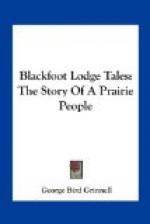III
The sun was already in the middle when he awoke. His wounds were swollen and painful; yet he hobbled on for a time, until the pain became so great he could go no further, and he sat down, tired and discouraged.
“True the signs,” he said. “How crazy I was to go against them! Useless now my bravery, for here I must stay and die. The widows will still mourn; and in their old age who will take care of my father and my mother? Pity me now, oh Sun! Help me, oh great Above Medicine Person! Look down on your wounded and suffering child. Help me to survive!”
What was that crackling in the brush near by? Was it the Snakes on his trail? Mik-a’pi strung his bow and drew out his arrows. No; it was not a Snake. It was a bear. There he stood, a big grizzly bear, looking down at the wounded man. “What does my brother here?” he said. “Why does he pray to survive?”
“Look at my leg,” said Mik-a’pi, “swollen and sore. Look at my wounded arm. I can hardly draw the bow. Far the home of my people, and my strength is gone. Surely here I must die, for I cannot travel and I have no food.”
“Now courage, my brother,” said the bear. “Now not faint heart, my brother, for I will help you, and you shall survive.”
When he had said this, he lifted Mik-a’pi and carried him to a place of thick mud; and here he took great handfuls[1] of the mud and plastered the wounds, and he sung a medicine song while putting on the mud. Then he carried Mik-a’pi to a place where were many sarvis berries, and broke off great branches of the fruit, and gave them to him, saying, “Eat, my brother, eat!” and he broke off more branches, full of large ripe berries, for him; but already Mik-a’pi was satisfied and could eat no more. Then said the bear, “Lie down, now, on my back, and hold tight by my hair, and we will travel on.” And when Mik-a’pi had got on and was ready, he started off on a long swinging trot.
[Footnote 1: The bear’s paws are called O-kits-iks, the term also for a person’s hands. The animal itself is regarded as almost human.]
All through the night he travelled on without stopping. When morning came, they rested awhile, and ate more berries; and again the bear plastered his wounds with mud. In this way they travelled on, until, on the fourth day, they came close to the lodges of the Pik[)u]n’i; and the people saw them coming and wondered.
“Get off, my brother, get off,” said the bear. “There are your people. I must leave you.” And without another word, he turned and went off up the mountain.
All the people came out to meet the warrior, and they carried him to the lodge of his father. He untied the three scalps from his belt and gave them to the widows, saying: “You are revenged. I wipe away your tears.” And every one rejoiced. All his female relations went through the camp, shouting his name and singing, and every one prepared for the scalp dance.




